Twenty-five years after the mass shooting at Columbine High School in Colorado, a majority of public K-12 teachers (59%) say they are at least somewhat worried about the possibility of a shooting ever happening at their school. This includes 18% who say they’re extremely or very worried, according to a new Pew Research Center survey.
Pew Research Center conducted this analysis to better understand public K-12 teachers’ views on school shootings, how prepared they feel for a potential active shooter, and how they feel about policies that could help prevent future shootings.
To do this, we surveyed 2,531 U.S. public K-12 teachers from Oct. 17 to Nov. 14, 2023. The teachers are members of RAND’s American Teacher Panel, a nationally representative panel of public school K-12 teachers recruited through MDR Education. Survey data is weighted to state and national teacher characteristics to account for differences in sampling and response to ensure they are representative of the target population.
We also used data from our 2022 survey of U.S. parents. For that project, we surveyed 3,757 U.S. parents with at least one child younger than 18 from Sept. 20 to Oct. 2, 2022. Find more details about the survey of parents here.
Here are the questions used for this analysis, along with responses, and the survey methodology.
Another 31% of teachers say they are not too worried about a shooting occurring at their school. Only 7% of teachers say they are not at all worried.
This survey comes at a time when school shootings are at a record high (82 in 2023) and gun safety continues to be a topic in 2024 election campaigns.
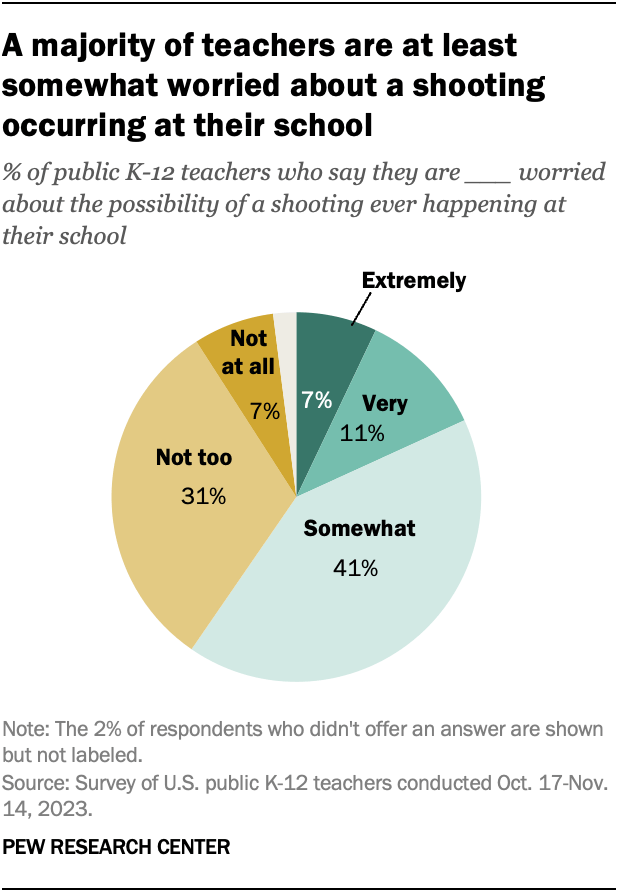
Teachers’ experiences with lockdowns
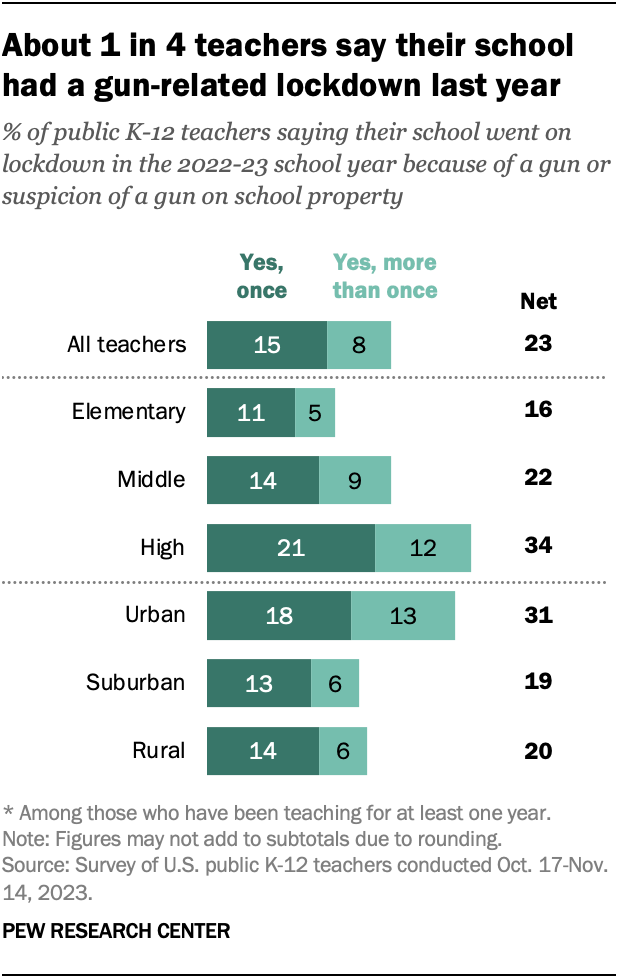
About a quarter of teachers (23%) say they experienced a lockdown in the 2022-23 school year because of a gun or suspicion of a gun at their school. Some 15% say this happened once during the year, and 8% say this happened more than once.
High school teachers are most likely to report experiencing these lockdowns: 34% say their school went on at least one gun-related lockdown in the last school year. This compares with 22% of middle school teachers and 16% of elementary school teachers.
Teachers in urban schools are also more likely to say that their school had a gun-related lockdown. About a third of these teachers (31%) say this, compared with 19% of teachers in suburban schools and 20% in rural schools.
Do teachers feel their school has prepared them for an active shooter?
About four-in-ten teachers (39%) say their school has done a fair or poor job providing them with the training and resources they need to deal with a potential active shooter.
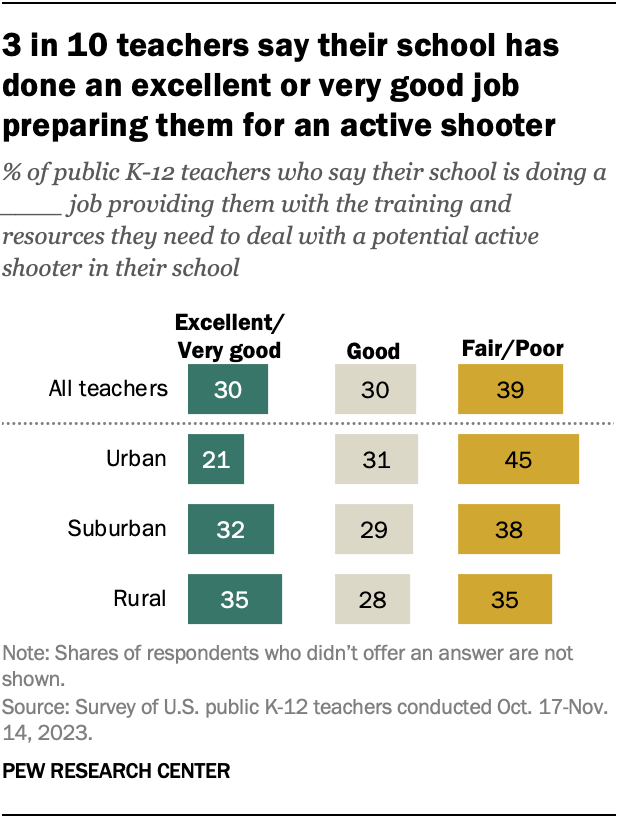
A smaller share (30%) give their school an excellent or very good rating, and another 30% say their school has done a good job preparing them.
Teachers in urban schools are the least likely to say their school has done an excellent or very good job preparing them for a potential active shooter. About one-in-five (21%) say this, compared with 32% of teachers in suburban schools and 35% in rural schools.
Teachers who have police officers or armed security stationed in their school are more likely than those who don’t to say their school has done an excellent or very good job preparing them for a potential active shooter (36% vs. 22%).
Overall, 56% of teachers say they have police officers or armed security stationed at their school. Majorities in rural schools (64%) and suburban schools (56%) say this, compared with 48% in urban schools.
Only 3% of teachers say teachers and administrators at their school are allowed to carry guns in school. This is slightly more common in school districts where a majority of voters cast ballots for Donald Trump in 2020 than in school districts where a majority of voters cast ballots for Joe Biden (5% vs. 1%).
What strategies do teachers think could help prevent school shootings?
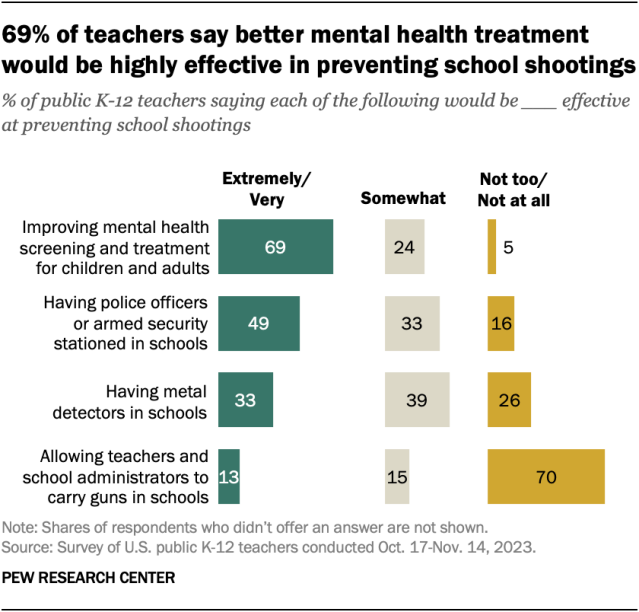
The survey also asked teachers how effective some measures would be at preventing school shootings.
Most teachers (69%) say improving mental health screening and treatment for children and adults would be extremely or very effective.
About half (49%) say having police officers or armed security in schools would be highly effective, while 33% say the same about metal detectors in schools.
Just 13% say allowing teachers and school administrators to carry guns in schools would be extremely or very effective at preventing school shootings. Seven-in-ten teachers say this would be not too or not at all effective.
How teachers’ views differ by party
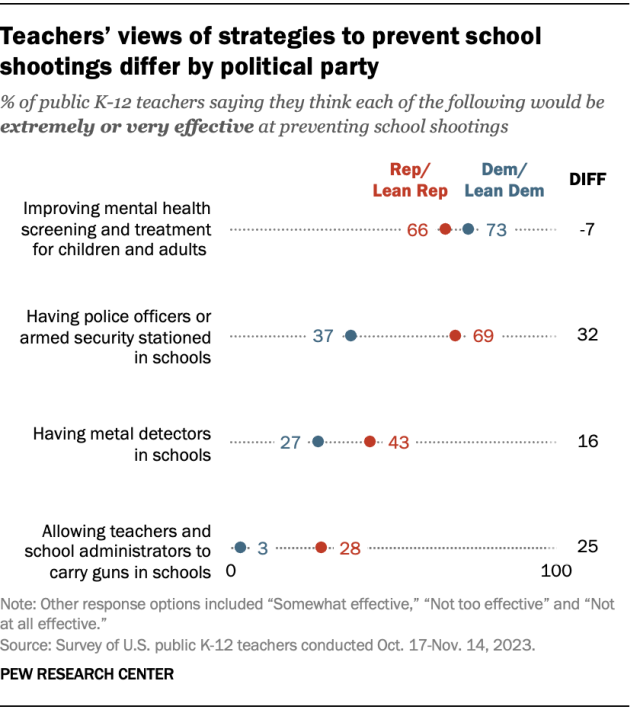
Republican and Republican-leaning teachers are more likely than Democratic and Democratic-leaning teachers to say each of the following would be highly effective:
- Having police officers or armed security in schools (69% vs. 37%)
- Having metal detectors in schools (43% vs. 27%)
- Allowing teachers and school administrators to carry guns in schools (28% vs. 3%)
And while majorities in both parties say improving mental health screening and treatment would be highly effective at preventing school shootings, Democratic teachers are more likely than Republican teachers to say this (73% vs. 66%).
Parents’ views on school shootings and prevention strategies
In fall 2022, we asked parents a similar set of questions about school shootings.
Roughly a third of parents with K-12 students (32%) said they were extremely or very worried about a shooting ever happening at their child’s school. An additional 37% said they were somewhat worried.
As is the case among teachers, improving mental health screening and treatment was the only strategy most parents (63%) said would be extremely or very effective at preventing school shootings. And allowing teachers and school administrators to carry guns in schools was seen as the least effective – in fact, half of parents said this would be not too or not at all effective. This question was asked of all parents with a child younger than 18, regardless of whether they have a child in K-12 schools.
Like teachers, parents’ views on strategies for preventing school shootings differed by party.
Note: Here are the questions used for this analysis, along with responses, and the survey methodology.
